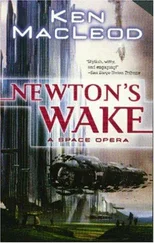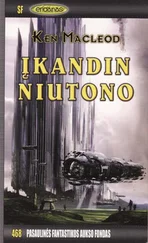He clipped the two plates on to their respective platforms and turned on the electric light that illuminated them from behind. The electric motor that flipped the mirror he set to its lowest speed, producing a blink rate of three per second. Then he perched on a stool and kicked off his sandals to grip a crossbar with his toes and clicked the lowest magnification of the monocular lenses into place. Peering through, he aligned the plates, by angle and by vertical and horizontal axes. Then he moved his hands to the paired knobs that shifted the view vertically and horizontally, and began in the top left-hand corner.
By the middle of the afternoon he had finished examining the fourth pair of plates. As he carried the plates back to the table he gazed out of the window, focused on infinity, and noticed the spots that danced in front of his eyes. Time to take a break. At the same moment the half-shaped thought that had struck him when he’d looked at the dirigible engine and propeller came back to his mind, fully formed.
He yelped. He laughed. “How stupid of us not to have thought of that!” he said aloud.
Darvin wanted to share it at once. He couldn’t share it with Orro; the Gevorkian physicist would be lecturing or calculating, and in neither activity would he tolerate interruption, however well intended or urgent. Oh well — Orro might turn up at the drinking den in the evening, as he’d hinted. But still, but still — Darvin couldn’t wait. Suppose he were to die at this moment, suppose his heart were to fail or brain to fuse, why then the great insight would be lost to the world! It was intolerable!
With a sort of morbid solemnity, Darvin grabbed a pen and sheet of paper. He sketched out and described the notion, and clipped the note to one of the platforms on the blink comparator. Let fate do its worst now, he thought, this idea wouldn’t die with him. Unless a meteor or dirigible were to crash into his office… He smiled at his overheated fancies. The impulse to tell someone right now didn’t go away. He felt as if something would explode out of his chest if he didn’t tell someone.
He looked at the clock on the wall, and at a timetable. He could tell Kwarive.
Darvin clambered out of the window and threw himself into the air. He flew to the Life Sciences Building and swooped under the canopy of the Lecture Pit. A cone of light rose out of the dark; slides illustrating the lecture were projected from below onto the canopy. He circled outside the cone, looking down, letting his eyes adjust. The lecturer stood in the middle, at the bottom; above him rose twenty or so tiers of concentric wooden rings, scattered with students hanging upside down, wings enfolding them as though asleep, eyes in most cases open, ears pricked. Darvin circled until he spotted Kwarive, hanging on the fourth ring, and dropped in beside her to the mutters and sideways shuffles of her neighbours. He clamped his feet around the railing, swung down, grinned apologies to left and right, and nuzzled Kwarive’s shoulder through the warm skin of her whig.
“Something to tell you,” he said. “Really exciting.”
She smiled and shushed him. “I’m listening,” she whispered. “To the lecture,” she added.
Darvin pulled a disappointed face and settled to listen too. The illustration in light above him was of a human, all limbs outspread, matched with the smaller but similar shape of a flitter.
“ — philosopher Dranker, in the Classical Age of Orkana, was the first to classify humanity with the Chiropterae,” the lecturer said, “in his great work De Vita , which comes up to us in regrettably fragmentary form. It was only in the Dawn Age that Nargo, in his Tabulae Animalia , took the bolder step of subsuming man and flitter within the order Octomana — the eight-handed. Why was this bold?”
Because we don’t have eight hands, Darvin thought, but the question was rhetorical.
“This is why.” The slide projector rattled through a dozen or so pictures, all of them crowded with photographs or engravings of diverse animals: trudges, various other species of flitter, cursors, grazers, hunters, swimmers; it settled on a bright and much-enlarged photograph of a skitter, its beady red eyes staring, its bristles in mid-twitch, its hands clutching a nut and a berry and clinging to the twig on which it crouched. “This lowly little beast is the third member of that order, and close — as we would now put it — to the ancestral form. The bifurcate distal portion of the anterior and posterior limb—”
Why, Darvin wondered, did lecturers insist on larding their language with Orkanisms?
“ — and eight manipulative extremities are in fact the primitive condition, from which those of the Chiropterae including ourselves are derived. In the chiropteran arm one hand and forearm has become the wing; in the foot, the two are fused, but the condition is still evident though relict, in our heel-claws. All of the land vertebrates — amphibians, reptiles, and mammals — and the sea mammals and reptiles are descended from octomanal ancestors, as can be shown by comparative anatomy—”
More slides.
“ — embryology, and teratology.”
“Ugh!” grunted Kwarive, as the slides illustrating the last-mentioned study flashed past.
“In conclusion then: far from being the crown of creation, as our illustrious ancestors fondly imagined, humanity is a minor offshoot of one of the most primitive of the mammalian classes. An outline of human evolution will be the subject of my next lecture, here tomorrow at noon sharp. Suggested readings are given in the handouts. Dismissed.”
With that he leapt into the air, flapped spiralling up the lecture pit, and flew out. The room filled with flapping wings and chattering voices. Darvin’s overloaded proximity sense made him see red. He clung to the rail until the air was clearer, then glanced at Kwarive.
“After you,” he said. She launched and he followed her, out of the building and into the nearest of Five Ravines’ many small public parks. Kwarive landed on a long bare branch of an ancient tree and perched upright on it. Darvin perched beside her. They looked at each other for a moment. Kwarive groomed behind Darvin’s ear. He stroked her neck, admiring as always the subtle shading of the fur, from red at the ear to pale gold below the jaw. He wanted to enfold her in his wings, but this was too public a place.
“What’s your exciting news?” Kwarive asked.
Darvin told her about his experiments with Orro, and she laughed. He went on to tell her of his idea. She clapped her hands and flapped her wings. “Brilliant!” she said. “Using the propeller like that is very ingenious.”
“Isn’t it indeed,” said Darvin. “I can’t wait to see Orro’s face when I tell him.”
Orro’s face did not disappoint, when Darvin told him the following morning. He’d gone round as soon as Orro had telephoned him to say that the film was ready.
“How stupid of me not to have thought of that,” Orro said. “We’ll definitely try that next. But let’s have a look at the film anyway.”
Orro closed the slat blinds on the windows and started up the film projector. The jerky kinematographic record of Darvin’s imitated flight made it all too clear that static flapping was not the same as flying. The film ran out and the tail end of it slapped at the wheel. Orro sighed and turned the projector off.
“So much for that,” he said, opening the blinds again, blinking. “I’ll keep it for comparison purposes, of course.” He strolled to the engine nacelle and stroked the propeller blade. “I’ll rig up something so that we can test your idea,” he went on. Abstracted, he didn’t look at Darvin. “I may be some time.”
“I’ll see myself out,” said Darvin.
Читать дальше












